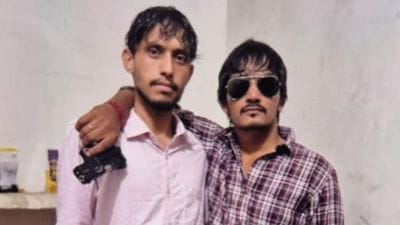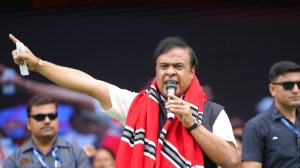Why Modi is lucky he’s not in Geneva
Presenting India’s case before the UN Commission on Human Rights in Geneva today, Justice J S Verma, made a reference to the carnage in...

Presenting India’s case before the UN Commission on Human Rights in Geneva today, Justice J S Verma, made a reference to the carnage in Gujarat saying that the National Human Rights Commission had made ‘‘precise recommendations’’ and would decide on its next steps after the state and the Central governments respond.
He made clear what the NHRC’s stand was on the responsibility of the government: ‘‘It is the primary and inescapable responsibility of the State to protect the right to life, liberty, equality and dignity of all those who constitute it’’ and ‘‘the responsibility of the State to ensure that such rights are not violated either through overt acts, or through abetment or negligence.’’
‘‘It is a clear and emerging principle of human rights jurisprudence that the State is responsible not only for the acts of its own agents, but also for the acts of non-State players acting within its jurisdiction.
The State is, in addition, responsible for any inaction that may cause or facilitate the violation of human rights,’’ Justice Verma said in his statement, circulated among members at the UNHRC’s 58th session in Geneva.
The statement, which was to have been made orally, was circulated after India declined to take the floor, protesting the UNHRC decision to allocate barely an hour on the views and voices of national institutions. Justice Verma, on his part, made it clear that the NHRC enjoyed enough ‘democratic space’ to function within India.
He said the situation in Gujarat was being monitored closely and a ‘‘a number of precise recommendations’’ had been made to bring to justice those responsible for the rights violations and to lessen the suffering of the victims.
‘‘The proceedings of the Commission have been sent to the Central and State Governments for their response, after receiving which the Commission will reflect on what further needs to be said and done,’’ Justice Verma said, noting that both the President and Prime Minister had expressed ‘‘their deepest anguish’’ over Godhra and the subsequent violence.
On the controversial Prevention of Terrorism Ordinance, Justice Verma said the NHRC had opposed it but ‘‘respects and honours the Constitutional process leading to the adoption of this Act.’’
Yet the Commission, he said, ‘‘retains its responsibility under its statute to ensure that the Act is not implemented in a manner that is violative of the Constitution and treaty obligations of our country.’’
He pointed out ‘‘while the entire world has, with good reason, been compelled to face the challenge of international terrorism since September 11, India has fought this battle, often alone, since the 1980s.
And over this period it has continuously had to face the question of whether and how this battle —that must be fought and won — can be reconciled with the preservation of human rights norms.’’
Photos





- 01
- 02
- 03
- 04
- 05


























